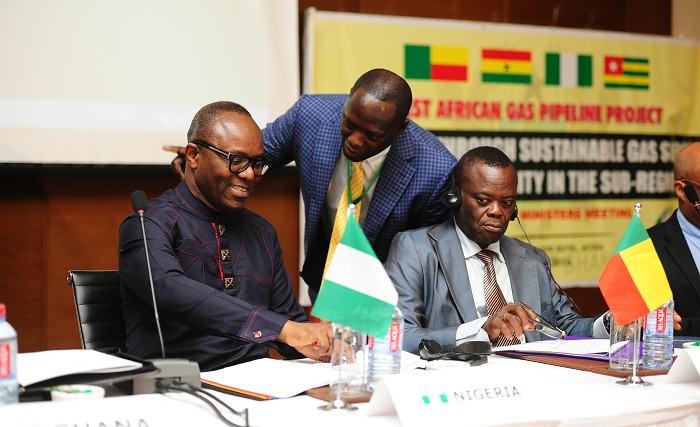
Decision to build gas pipeline due to high WAPCo tariffs
Ghana’s decision to build its own gas pipeline from the gas processing plant at Atuabo in the Western Region to Tema in Greater Accra has been attributed to high tariffs from the West Africa Pipeline Company (WAPCo).
Advertisement
The Ghana Gas Company Limited (Ghana Gas) and the Yantai Jereh Oilfield Services Group Co. Ltd of China, on September 7, 2016, signed a multi-million dollar project implementation agreement for an onshore natural gas transmission pipeline (NGTP) to be constructed in Ghana.
The pipeline will be fed with gas from the Jubilee, TEN and ENI projects offshore the Western Region.
Addressing a meeting of the Committee of Ministers of the West Africa Gas Pipeline Project, Ghana’s Minister of Petroleum, Mr Emmanuel Armah-Kofi Buah, stated that due to WAPCo’s delay in agreeing to a workable tariff with the West Africa Gas Pipeline Authority (WAGPA), Ghana had deepened its resolve to construct a dedicated pipeline from Takoradi to Tema.
Mr Buah, who is the Chairman of the committee, said “one has to bear in mind that a tariff that does not attract gas transportation contracts yields zero revenue”.
He urged WAPCo to be more creative in its tariff-setting scheme to meet global changes, stressing that while recognising the agreed transportation arrangements, WAPCo should take a more pragmatic approach to its decision making.
VRA challenges
Mr Buah blamed the Volta River Authority’s (VRA’s) inability to pay for gas consumed on WAPCo’s failure to transport the expected volumes of gas to the VRA’s power plants for power generation.
He said the pipeline damage and repair works in 2012 and 2013 compelled the VRA to “switch to extremely expensive alternative fuel”.
“This situation obviously made it tougher for the VRA to pay its debts and resulted in periodic threats of curtailment of gas supply from N-Gas and WAPCo,” he said.
He said the situation finally culminated in total curtailment of gas supply by WAPCo and N-Gas to the VRA in June 2016, adding that the continued curtailment of gas supply would further constrain the VRA’s ability to pay its debt.
He, therefore, urged the committee members to take proactive steps to bring a lasting solution to the highlighted problems.
WAPCo boss
The Managing Director of WAPCo, Mr Walter Perez, disclosed that the VRA had paid $20 million of its debt, leaving a balance of $30 million, as agreed upon in Abuja in July 2016.
He also announced that 30 million standard cubic feet of gas was currently available to be supplied to the VRA, while an additional 60 million cubic feet would be made available by the end of the year.
Despite those developments, he said, the financial position of WAPCo remained very desperate because of an outstanding balance of $162 million, of which $98 million was owed to WAPCo.
He said WAPCo would be forced to take drastic actions in the short term if its debtors did not make regular payments.
Mr Perez, therefore, sought the support of the committee to “re-establish the enabling environment for producers, consumers and transporters to equitably share in the risks and rewards of this great project”.
Other Speakers
The Minister of Petroleum of Nigeria, Dr Emmanuel Ibe Kachikwu, in a brief remark, charged the members of the committee to find solutions to the myriad of problems facing the gas supply chain.
“We will not leave here today until we find solutions to our problems,” he stressed.
Togo’s Minister of Petroleum, Mr Dederiwe Ably-Bidaman, and the ECOWAS Commissioner of Energy and Mines, Dr Morlaye Bangoura, commended the committee members for their hard work and expressed the hope that challenges facing the gas project would be solved in no time.
The Ghana Gas project
The construction of the pipeline will begin in the next six months and be completed in 24 months.
The 24-inch, 290-kilometre onshore pipeline will pass through the Western, Central, Eastern and Greater Accra regions.
It is expected to handle a maximum capacity of 380 million standard cubic feet of gas per day (mmscfd) in phase one and up to a maximum capacity of 550mmscfd in phase two.



